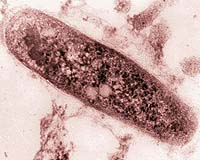| . |  |
. |
Port-Au-Prince (AFP) Nov 11, 2010 Haiti's cholera crisis deepened on Thursday as the toll soared again and three more deaths in the teeming capital raised fears the epidemic could explode in camps full of earthquake survivors. "We greatly fear a flare-up in the capital which would be serious given the conditions in the camps," Claude Surena, president of the Haitian Medical Association, told AFP. Haitian authorities have been warned to expect a different scale of disaster if cholera takes hold in Port-au-Prince, much of which was flattened by a January earthquake that killed more than 250,000 people. An estimated 1.3 million Haitians live in refugee camps, most in tent cities around the capital where water-borne cholera could spread easily in filthy conditions where scarce supplies are shared for cooking and washing. The Haitian health ministry says 724 people have now died from the highly contagious disease and the number of infections around the country has passed the 11,000 mark. The outbreak, Haiti's first in more than 50 years, erupted in the Artibonite River valley in mid-October and initially seemed to have been contained to central and northern areas. But there have been roughly 1,000 new cases each day this week and the death curve is getting steadily steeper with 60 new fatalities recorded on Wednesday and more than 80 on Thursday. More worrying still is the fact that three more deaths have been confirmed in Port-au-Prince, which recorded its first fatality from the disease on Tuesday. "If cholera cases continue to rise at this rate, we'll quickly be overwhelmed," warned Yves Lambert, head of infectious diseases at the main public hospital in central Port-au-Prince. Although easily treated, cholera has a short incubation period and causes acute diarrhea that can lead to severe dehydration and death in a matter of hours. According to statistics down on the health ministry's website, 497 of the deaths, or two-thirds of the total, have been around the epicenter of the outbreak in the northern region of Artibonite. Surena said the recent surge in deaths and infections was mostly due to a "flare-up" in certain parts of Artibonite, but admitted deep concern also about a possible explosion in cases in the capital. "We must look out for that and drive up people's awareness about the situation," he said. Hurricane Tomas, which claimed more than 20 lives in Haiti at the weekend, aggravated the situation as it dumped heavy rains that caused rivers, including the believed source of the cholera, the Artibonite, to flood. The storm damage has increased concern about the plight of Haitians in rural areas, where many cholera sufferers are reported to be struggling to get medical help, some of them in villages cut off by the flooding. "Think about all the rural communities in which there are no doctors... no nurses... in which people are dying," said David Walton, a doctor from Boston with 13 years of experience treating patients in Haiti. "(Cholera) is there and its (infection rate is) much higher. We're just not hearing about it," Walton told CBS's "60 Minutes." Desperate scenes were described earlier in the week in the major northern town of Gonaives where some 60 people were said to have died with cholera-like symptoms in just a few days. "Sick people died on the way to the hospital, the bodies were covered in blankets and left near the town cemetery," mayor Adolphe Jean-Francois told AFP. The Pan American Health Organization, the regional office of the UN's World Health Organization, has warned Haiti to expect hundreds of thousands of cases of cholera over several years now that the disease appears to have taken hold. In a grim reminder of January's earlier disaster, a small earthquake on Thursday morning shook the Port-au-Prince suburb of Carrefour, sending children in one school into a panic. "I was in the classroom with the children when we felt the tremor rattle the building. The pupils rushed to the door and several were injured in the crush," school principal Alex Auriol told AFP.
Share This Article With Planet Earth
Related Links Epidemics on Earth - Bird Flu, HIV/AIDS, Ebola
 Tuberculosis levels off with progress in China, India: WHO
Tuberculosis levels off with progress in China, India: WHOGeneva (AFP) Nov 11, 2010 The World Health Organisation said on Thursday that the number of cases of tuberculosis worldwide had levelled off last year, with lifesaving inroads against the disease especially in China and India. An estimated 9.4 million people contracted the disease in 2009, the same number as the previous year, the WHO's annual report, "Global Tuberculosis Control 2010" found. The WHO said the inc ... read more |
|
| The content herein, unless otherwise known to be public domain, are Copyright 1995-2010 - SpaceDaily. AFP and UPI Wire Stories are copyright Agence France-Presse and United Press International. ESA Portal Reports are copyright European Space Agency. All NASA sourced material is public domain. Additional copyrights may apply in whole or part to other bona fide parties. Advertising does not imply endorsement,agreement or approval of any opinions, statements or information provided by SpaceDaily on any Web page published or hosted by SpaceDaily. Privacy Statement |